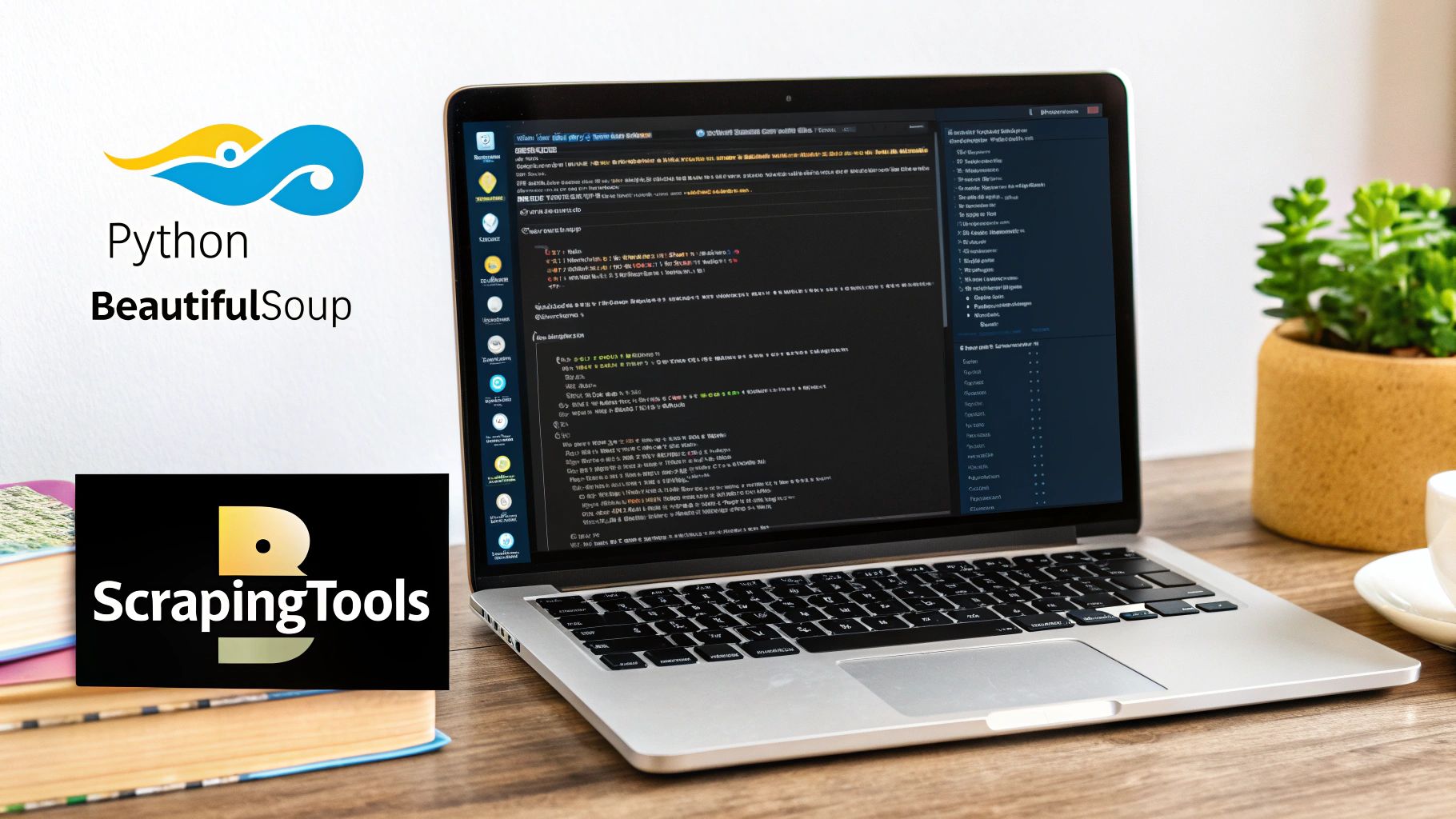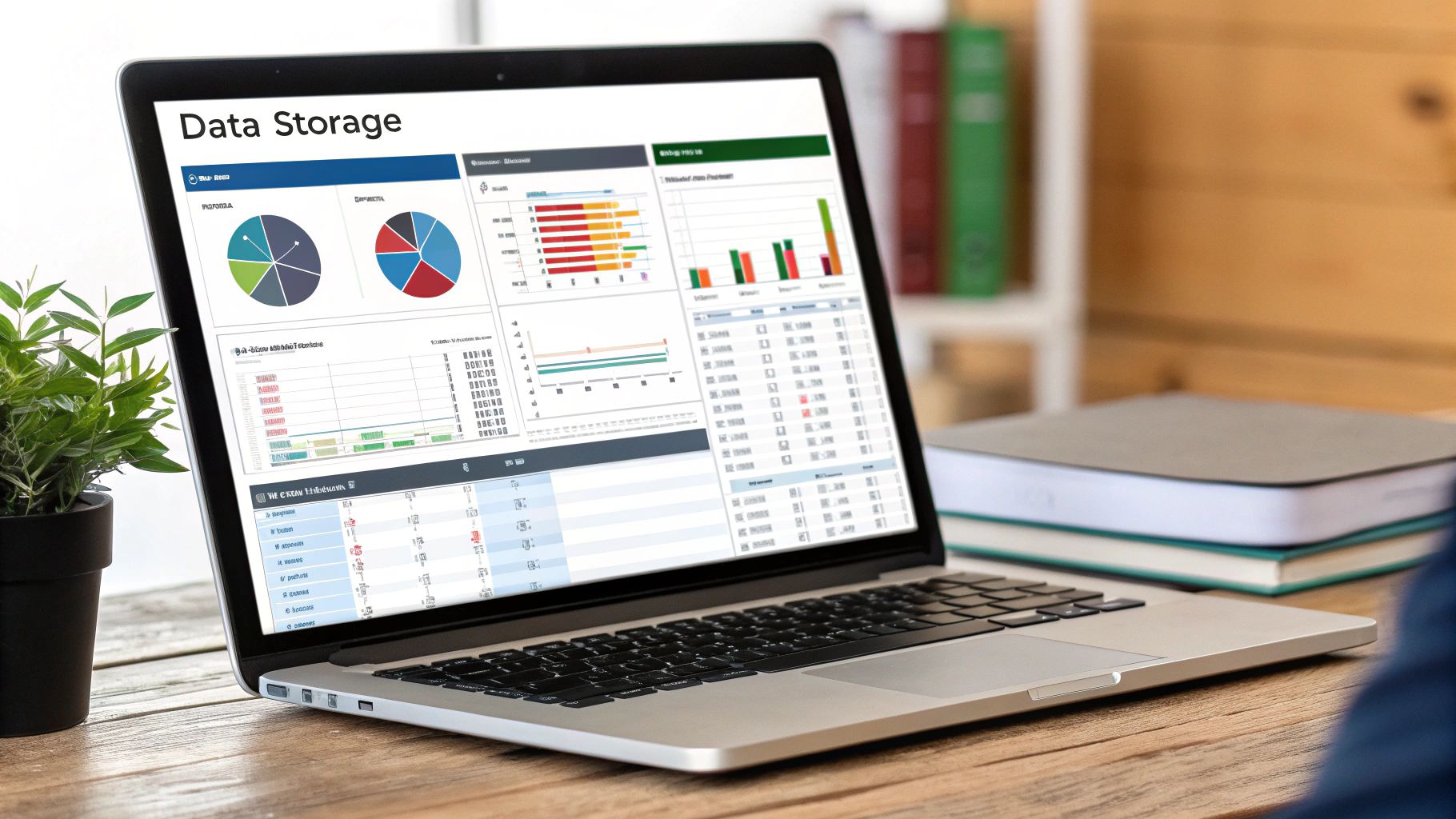Mastering Web Scraping for Real Estate

What if you could see every new listing, price drop, and market shift in real time, long before your competitors even get their morning coffee? That isn't a far-fetched dream; it's what web scraping for real estate delivers. It's about moving past the slow, tedious grind of manual research and into a world where your decisions are powered by fresh, comprehensive data.
Why Web Scraping Is an Essential Tool for Real Estate

In an industry where timing is everything, being stuck with outdated reports or spending hours on manual data entry is like showing up to a race on a tricycle. Web scraping completely changes the game by automating the collection of critical information from property giants like Zillow, Rightmove, or your local MLS portals.
Forget spending your entire day copying and pasting property details. A well-configured scraper can do all that heavy lifting in a matter of minutes.
But it’s not just about doing things faster. It's about the sheer scale and depth of information you can gather. Imagine monitoring thousands of listings across multiple zip codes at once, automatically logging every price change, status update, or new property that appears. It’s like having a dedicated team of market analysts on your payroll, working 24/7.
Gaining a Competitive Advantage with Data
The real estate world runs on data now more than ever. This isn't just a feeling; the numbers back it up. The global web scraping market has exploded, with projections showing a compound annual growth rate (CAGR) somewhere between 11.9% and 18.7%.
A huge driver of this growth is the real estate sector. Today, over 60% of real estate agencies in the U.S. and Europe are using automated data extraction for their analytics. That's a massive leap from less than 25% just five years ago. This isn't just a trend; it's a fundamental shift in how the industry operates.
Real estate professionals who embrace web scraping aren't just keeping up; they're getting ahead. They can:
- Spot Undervalued Properties: By comparing listing prices against historical sales data and neighborhood averages, you can find hidden gems that others miss.
- Analyze Market Dynamics: Collecting granular data on pricing trends, average days on the market, and inventory levels helps you predict where the market is headed.
- Track Competitor Activity: Keep tabs on the listings and strategies of rival agents and firms to better position yourself in the market.
This is about making a fundamental shift from being reactive to being proactive. You stop just following the market and start anticipating its next move, armed with data to back up your instincts.
Getting started with this is far more straightforward than you might imagine. A tool like our no-code Chrome extension lets you start pulling valuable real estate data almost immediately. Download the Ultimate Web Scraper now and see for yourself how easy it is to build a powerful property database from scratch.
Picking the Right Tools for the Job

Let’s get one thing straight: you don't need to be a coding wizard to start web scraping for real estate. The real trick is finding a tool that fits what you’re trying to do, not one that forces you to learn a new language. You'll find everything from complex, custom-built scripts to simple browser extensions that do the heavy lifting for you.
For most real estate pros I talk to, a no-code tool is the way to go. These are designed for people who need to get things done—letting you focus on the market data, not the technical jargon.
How to Choose a Scraper for Real Estate Data
When you're looking at different tools, it's all about trade-offs. Sure, a custom Python script gives you endless flexibility, but it also demands serious coding skills and a ton of time to build and keep running. On the flip side, a good browser extension offers a point-and-click interface that can deliver results in minutes. It's a game-changer.
If your goal is to pull property listings, pricing data, and agent info, a specialized extension is almost always the smarter, faster choice. It just removes all the technical roadblocks.
That’s exactly why we made the Ultimate Web Scraper. It’s a Chrome extension we designed to feel intuitive. You can literally start grabbing data from Zillow, Redfin, or your local MLS with just a few clicks. It turns a ridiculously complex process into a simple task. Want to try it? You can download our Chrome extension and start scraping in minutes.
My Two Cents: Your goal isn't to become a software developer overnight. It's to get the data you need, quickly and easily. A solid no-code tool lets you do just that without the headache.
Do a Little Homework Before You Scrape
Before you hit that "extract" button, a bit of prep work will save you a world of frustration. Think of it like walking a property before you put in an offer. You need to know the layout and spot what's truly valuable.
First, just go to a property listing page you want to scrape. Take a good look at how it's all laid out. Where's the price? How is the address structured? What about the square footage, bedrooms, or the agent's contact details? These are the exact data points you’ll tell your scraper to hunt down.
Next, figure out how you'll handle multiple pages of results. Most sites spread their listings across dozens of pages. A decent scraper needs to handle this pagination automatically, grabbing every listing without you sitting there clicking "next" 50 times.
Here’s a quick mental checklist I run through:
- Pinpoint Key Data: What fields do I absolutely need? (e.g., Price, Full Address, Sq. Ft., Days on Market).
- Study the Page Layout: Where does this info live on the page? Is it consistently in the same spot from one listing to the next?
- Check for Pagination: How does the site handle multiple pages? Look for "Next" buttons or numbered page links.
Doing this quick recon ensures you’re not just pulling a chaotic mess of information. Instead, you're building a clean, organized dataset that's ready for real market analysis. For a deeper dive on the pros and cons of different options, check out our comparison of popular web scraping tools.
Getting Your Hands Dirty: Scraping Your First Real Estate Website
Alright, let's move from theory to action. I’m going to walk you through a real-world scenario so you can see just how straightforward it is to start pulling valuable property data using our Ultimate Web Scraper. Forget about technical headaches; this is all about gathering market intelligence in minutes.
Before we jump in, a little background knowledge can go a long way. Having a basic grasp of web design best practices can make identifying data points and setting up your scraper feel much more intuitive. It helps you recognize the patterns in how information is laid out on a page, which is the secret to efficient scraping.
Visually Selecting Your First Data Points
The real beauty of a modern tool like this is that you don’t need to be a coder. You just interact with the webpage visually. Once you download our Chrome extension and you're on a real estate search results page, just activate the scraper.
From there, simply hover your mouse over the piece of information you want to grab. You’ll see different elements on the page highlight. See the prices? Just click on one of them, and the tool is smart enough to figure out you want all the prices on that page. It works the same way for bedroom counts, agent names, or property addresses.
It really is a point-and-click affair:
- Property Prices: Click one price, and you’ll get them all.
- Agent Details: Select an agent's name or agency to collect their contact info.
- Listing Titles: Click on a property address or headline to pull a complete list of properties.
This visual selection method completely demolishes the technical barrier, making web scraping for real estate something anyone can do. No more wrestling with HTML or trying to write complex selectors.
The core idea here is incredibly simple: If you can see it on the page, you can scrape it. The tool essentially translates your clicks into a repeatable recipe for data extraction, turning what used to be a complex task into just a few simple actions.
Tackling Dynamic Content and Pagination
So, what happens when you’re on a site where new listings load as you scroll down? This is a common feature on modern real estate portals and a classic challenge for scrapers. Our tool was built for exactly this. You can tell it to automatically scroll down the page a specific number of times, ensuring every single property is loaded before the extraction even starts.
Another common hurdle is pagination, where search results are split across dozens or even hundreds of pages. Nobody has time to manually click "Next" over and over. Instead, you can configure the scraper to automatically navigate through every page, collecting data from each one until it hits the end. This is how you guarantee a complete dataset, not just a small sample from the first page.
For a concrete example, check out our guide on how to extract Realtor.com property listings and export them to CSV or Excel. It walks through these exact scenarios step-by-step.
This visual gives you a great overview of the entire workflow.
As you can see, the whole operation breaks down into three clear stages: identifying your target, extracting the key details, and organizing the final data.
Digging Deeper on Detail Pages
Often, the real goldmine of data isn't on the search results page; it's buried within the individual property listings. To get things like detailed property descriptions, sales history, or a full list of amenities, you need to set up a two-step process.
First, you'll scrape the links to all the individual property pages from the main search results. Then, you simply instruct the scraper to visit each of those links and pull the more detailed information you need from those pages. This is the secret to building a truly comprehensive dataset that gives you a competitive edge.
The real estate market is fierce, and this level of data intelligence can be a significant advantage. Top-tier scraping tools can pull and process data from over 50,000 websites globally, including major platforms like Zillow and Rightmove. Beyond just listings, they can analyze news sentiment and track amenity trends to reveal what today’s buyers are actually looking for.
Turning Raw Data Into Actionable Market Insights
Getting the data is just the first part of the puzzle. The real magic in web scraping for real estate happens when you take that raw information from your spreadsheet and turn it into a strategic advantage. Think of your CSV file filled with property details as a treasure map—you just need to know how to read it.
The best part? You don't need a complex or expensive software suite to do this. Your go-to tools like Google Sheets or Microsoft Excel are perfectly equipped for the job. This is the moment you graduate from simple data collection to generating genuine market intelligence.
Cleaning and Preparing Your Data
Before you can find any hidden gems, you have to do a little housekeeping. Scraped data is rarely perfect right out of the gate. Prices often come with dollar signs and commas, and address formats can be all over the place. Taking a few minutes to clean this up is non-negotiable for accurate analysis.
For instance, you'll likely need to:
- Standardize Pricing: You can't run calculations on "$1,250,000". Use a simple "Find and Replace" to strip out symbols (like $, £) and commas.
- Separate Address Components: A full address is good, but separate columns for the street, city, and zip code are much better for filtering and location-based analysis.
- Format Numeric Fields: Double-check that square footage, bedroom counts, and bathroom numbers are all formatted as numbers, not text.
Once your data is tidy and organized, you're ready to start asking the right questions. The answers will point you toward the market opportunities that most people miss. This prep work is crucial for any kind of market research; our guide on market research for small business dives deeper into how to structure data effectively.
Uncovering Hidden Opportunities Through Analysis
This is where your detective work truly begins. With clean, organized data, you can run simple calculations that reveal powerful trends and flag specific properties that deserve a second look.
Let's say you're an investor hunting for undervalued properties. A fantastic starting point is to calculate the average price per square foot for an entire neighborhood. Then, you can simply filter your list to show only the properties listed significantly below that average. It’s a straightforward but incredibly effective way to spot potential deals instantly.
Here are a few other practical analyses I’ve found valuable:
- Track Price Reductions: Scrape listings every few days. This lets you build a timeline of price changes and quickly spot properties with multiple price drops—a classic sign of a motivated seller.
- Identify Stale Listings: Calculate the "days on market" for every property. Listings that have been sitting for much longer than the local average might be ripe for a lower offer.
- Compare Agent Performance: See which agents dominate a target area or which ones consistently sell homes faster than their peers. This can inform your networking or partnership strategy.
Don't underestimate the impact of this approach. Major real estate investment trusts (REITs) have boosted their ROI by 15–20% on deals influenced by web scraping insights. In fact, a recent survey revealed that 75% of North American REITs now rely on scraping to find undervalued assets and keep an eye on competitors.
It’s one thing to collect data, but the real value comes from interpreting it correctly. To get more advanced, you can learn how to turn data into actionable insights and build truly data-driven confidence. To make this entire process smoother, you can export data directly from our Ultimate Web Scraper Chrome extension into your spreadsheet and jump straight into your analysis.
Navigating Common Scraping Challenges and Ethics

Pulling real estate data isn't just a technical exercise; it's about being a good digital citizen. I've learned from experience that if you want consistent, reliable access to data, you have to scrape responsibly. This means respecting the websites you're visiting. It’s not just about ethics—it’s about avoiding getting your IP address blocked.
Before I ever write a single line of a scraping recipe, my first move is always to check the site's robots.txt file. You can usually find it by just adding /robots.txt to the end of the main domain name. Think of this file as the website's house rules for bots. Ignoring it is the fastest way to get yourself banned.
Along those same lines, you need to dig into the site’s legal documents. Always check the Terms and Conditions to understand how they expect you to use their site and its content. This isn't just a formality; it's a critical step in scraping ethically and legally.
Overcoming Common Technical Hurdles
Once you've cleared the ethical groundwork, you'll run into the technical walls that modern websites put up. Real estate sites, in particular, are often dynamic and have defenses ready for automated traffic.
Here are a few roadblocks you’ll almost certainly encounter:
- CAPTCHAs: Those "I'm not a robot" puzzles are designed specifically to stop automated tools like yours.
- IP Bans: If you hammer a site with hundreds of requests in a minute from one IP, you're waving a giant red flag. Expect to get blocked, either temporarily or for good.
- JavaScript-Heavy Sites: A lot of property sites load their listings dynamically with JavaScript. If your scraper only reads the initial HTML, it will come back with nothing because the data hadn't even loaded yet.
A good rule of thumb is to make your scraper act like a human. A real person doesn't click 100 links a second. By slowing down and adding pauses between your requests, you'll look a lot less like a bot and are far less likely to trigger any alarms.
This is where a purpose-built tool like the Ultimate Web Scraper really shines. It's designed to handle many of these headaches for you, especially the tricky JavaScript-rendered content. It also helps manage your request flow, so you can sidestep the common traps that get less sophisticated scrapers shut down.
Instead of getting bogged down in a technical battle with anti-scraping measures, you can focus on the data you're actually after. A smart tool takes care of the complex mechanics behind the scenes. Ready to scrape smarter? You can Download the Ultimate Web Scraper from the Chrome Web Store and let it handle the heavy lifting.
Answering Your Real Estate Scraping Questions
When you're new to scraping real estate data, a few questions always seem to pop up. I get it. You want to make sure you're doing things right, using the best tools, and staying out of trouble. Let's walk through some of the most common queries I hear from people just like you.
Getting these answers straight will give you the confidence to start pulling the data you need to get ahead.
Is It Legal to Scrape Real Estate Listings?
This is the big one, and the short answer is yes—scraping publicly available data is generally legal. That's the key. If the information is out there for anyone to see without a login, it's usually fair game. Think Zillow listings, public property records, or agency websites.
However, being legal doesn't mean you can go wild. You have to be a good digital citizen. Before you start, always check a website’s Terms of Service and look for a file called robots.txt (you can usually find it by adding /robots.txt to the end of the main domain, like websitename.com/robots.txt). These tell you the site's official rules for bots. Following them is essential for ethical scraping and keeps you from getting on the site owner's bad side.
What's the Best Tool If I'm Not a Coder?
For anyone who isn't a developer, the best starting point is a no-code browser extension. Forget about learning Python or dealing with complex scripts. A good extension lets you simply point and click on the data you want—like price, address, or square footage—right on the webpage. It turns a highly technical task into something you can master in an afternoon.
These tools are built for professionals—agents, investors, analysts—who need the data, not the technical headache. The best way to see the power is to try it yourself; you can download our Chrome extension here.
Your goal isn't to become a programmer. It's to get your hands on actionable real estate data as fast as possible. A solid no-code tool removes the technical hurdles so you can focus on analyzing the market, not fighting with code.
For instance, instead of trying to figure out how to get data from multiple pages (a common challenge called pagination), a powerful extension can handle that for you automatically.
What Do I Do If a Website Blocks Me?
Sooner or later, you might run into a block. It's a common bump in the road. This usually happens when you send too many requests too quickly, and the website's security flags your activity as a potential attack.
The first thing to do? Slow down.
Try to space out your data requests to act more like a human browsing the site. If that doesn't work, the next step is often using a proxy service, which masks your IP address. Honestly, though, for most real estate scraping, just being patient and setting your tool to a slower, more human-like pace is all you need to do to fly under the radar.
Ready to skip the steep learning curve and start gathering property data now? PandaExtract - Ultimate Web Scraper is the no-code tool designed for exactly this. Grab our powerful Chrome extension and turn any real estate site into a clean, structured spreadsheet in minutes.
Published on